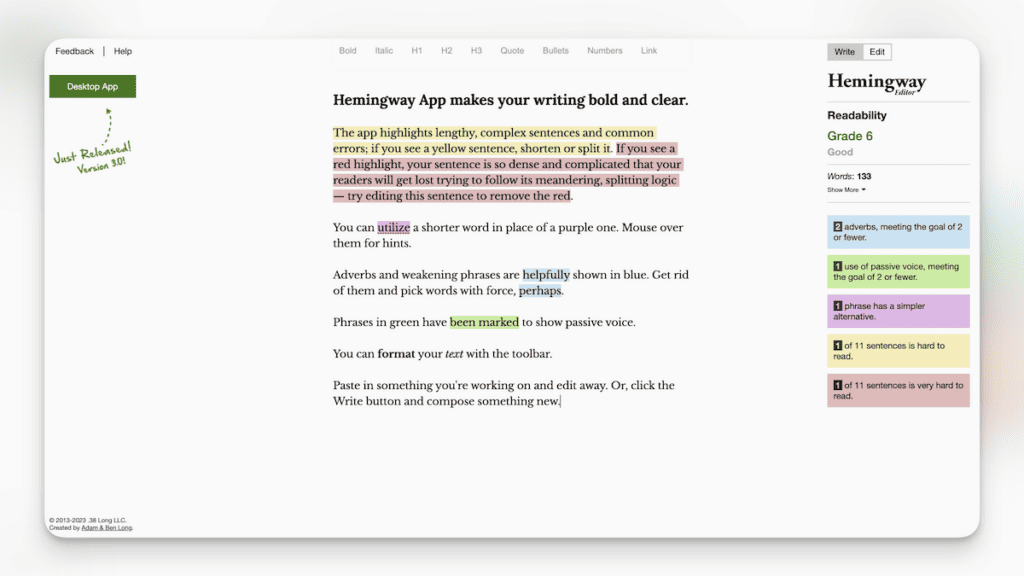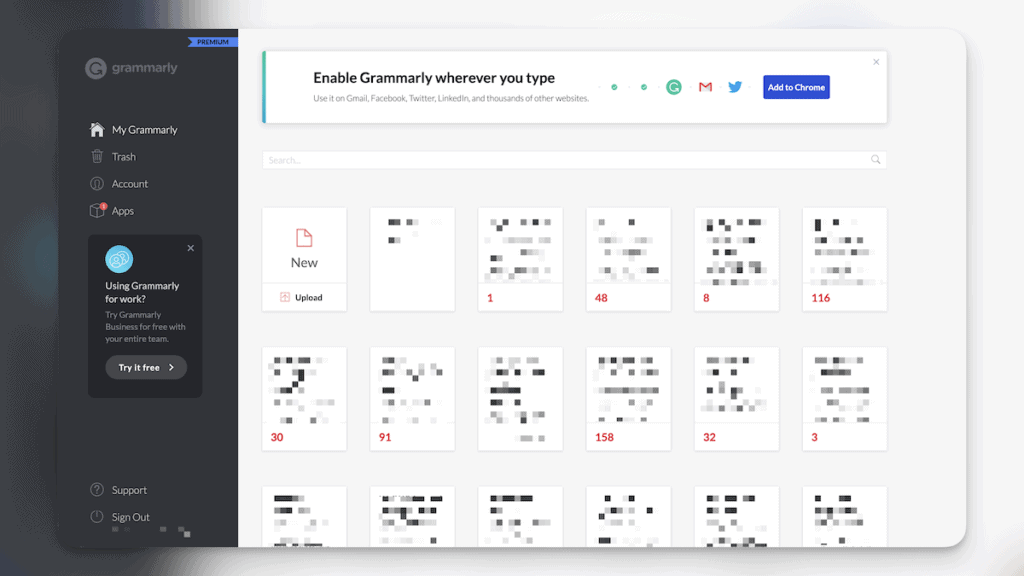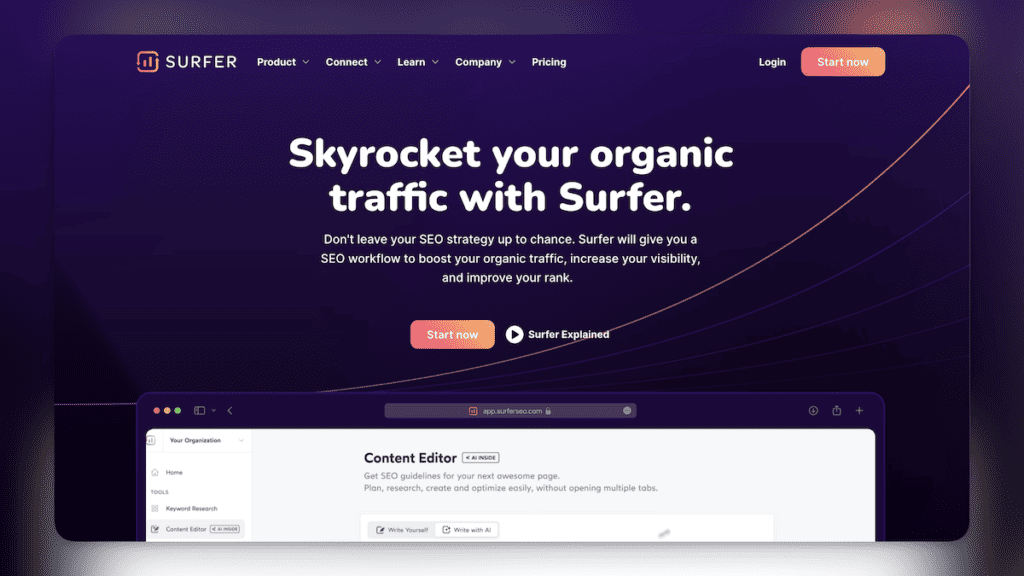Content writing is an essential part of any business’s digital presence. It helps to create engaging, informative content that drives leads and builds relationships. But with so many different forms of content, it can take time to figure out where to start when crafting your own pieces.
That’s why we’ve gathered top tips for creating compelling content across various formats. From blog posts to infographics and eBooks, these tricks will help you take control of your content creation process and ensure your readers get the most from what you have to offer.
So if you’re looking for a way to stand out from the crowd, sharpen up your skillset and make sure each piece works its most challenging for you, then read on! We’ve got the ultimate guide for ensuring every bit of content you produce has maximum impact – no matter what form it takes.

Key Takeaways from this article:
- Content writing is essential for businesses’ digital presence and helps create engaging, informative content.
- Content writers must have exceptional communication skills to engage their audience effectively.
- Different forms of content include blog posts, videos, podcasts, white papers & ebooks, social media posts, web pages, email marketing, internal communications, and brand journalism.
- Benefits of content writing include building a brand, engaging customers with stories, generating leads and sales.
- Strategies for effective content writing include finding unique angles or topics
Introduction To Content Writing
Writing content is a skill that requires creativity, knowledge and experience. Content writing encompasses the process of creating high-quality content for various forms of media. It involves crafting messages to build relationships with readers while conveying an intended message or purpose. Whether blog posts, articles, social media posts, web copy or other forms of online content, content writers must have exceptional communication skills to engage their audience effectively.
Content writers are responsible for producing compelling material to attract people who may not know about your business. They use research methods such as keyword analysis to ensure the written piece contains language that will resonate with readers and make them take action. By uniquely connecting words and ideas, content writers create stories that draw potential customers’ attention and convert them into loyal followers.
With great power comes great responsibility – especially when creating compelling content. So to start on the right foot, let’s explore what content writers do when they write content and how they help businesses succeed.

What Is A Content Writer?
Building on the previous section, this will cover what a Content Writer is and how they create content. A Content Writer takes an idea from concept to reality by researching, developing, editing and optimising written content for digital media or print publications. In addition, they must understand best practices in search engine optimisation (SEO) and know keyword research.
Content Writers also need excellent writing skills to successfully create compelling content that engages readers and helps them take action. They should also possess technical skills such as HTML coding to write web-friendly copy without losing their creative edge.
Additionally, they should have some experience with social media platforms like Facebook, Instagram, Twitter, YouTube and others so they can use these channels to promote the content created. In summary, Content Writers are responsible for producing engaging material that drives website traffic while simultaneously being optimised for SEO purposes.

Types Of Content Writing
Creating content comes in many forms, from content writing to content marketing and strategy. Knowing the different types of content can help you create a comprehensive content production plan for your brand. From print pieces to podcasts, here are some of the most popular ways to approach crafting messages:
Blog Posts
Blogging has become essential to any digital marketing strategy, allowing brands to showcase their expertise while driving traffic to their website. Blogs also provide search engine optimisation (SEO) benefits that other forms of content cannot match.

Videos
Videos offer audiences visual information they may not be able to get elsewhere, making them perfect for product tutorials or explainer videos. In addition, video is highly shareable across social media platforms and offers greater engagement opportunities than text-based posts.

Podcasts
Podcasts have seen a resurgence over the past few years, with new audio streaming services like Spotify and Apple Music making them easier than ever to find. They’re great for reaching niche audiences who prefer listening rather than reading long-form articles or watching videos online.

White Papers & Ebooks
Companies use white papers to research topics related to their industry or products to explore potential solutions. On the other hand, eBooks can be used for lead generation when customers download material after providing contact details such as email addresses.
By understanding all these various formats of content writing, marketers can craft effective messages explicitly tailored towards their target audience’s needs while increasing reach and visibility within their industry sector. In addition, with this knowledge, businesses can create impactful content that resonates with existing and prospective clients.

Benefits Of Content Writing
The types of content writing discussed in the previous section provide various benefits for businesses. For example, content writing can help build a company’s brand, engage customers with well-crafted stories, and generate leads that convert into sales. Furthermore, it enables companies to remain competitive in their respective industry by providing educational resources on various topics related to their products and services.
Content writing also helps develop a business’s online presence by creating content for various platforms such as websites, blogs, social media posts, emails and other digital channels. Writing compelling content increases visibility and strengthens customer relationships by providing helpful information about their products or services. Additionally, strong writing skills are invaluable for producing persuasive blog posts and articles that capture readers’ attention while adhering to the guidelines set forth by search engines like Google.
As more businesses embrace content marketing strategies such as brand journalism, there is an even greater need for skilled writers who understand how to create content tailored specifically for different formats and platforms.
Crafting compelling copy that resonates with audiences allows brands to stand out from competitors while driving traffic back to their websites. With this in mind, understanding all facets of successful content creation is essential for delivering engaging messages across multiple forms of media.
Having outlined the numerous advantages of content writing, we now focus on strategies for ensuring your work stands out from the crowd.
Strategies For Effective Content Writing
Making content that sticks out from the competition and draws readers in requires careful consideration of a few key points. Therefore, strategically crafting pieces to search engine optimisation and reader engagement has become essential for successful content writing. To do this, it’s important to keep some specific focuses in mind:
- Finding interesting angles or topics to cover that have yet to be explored.
- Taking into account current events while still offering something unique and fresh.
- Looking at what other writers are covering and separating your work by focusing on different aspects than they are.
- Writing content that will bring value to readers beyond just being entertaining, helping them learn something new or understanding complex concepts better is always appreciated.
- Ensure your article or post covers all the pertinent facts about its topic so readers can trust it.
- If applicable, incorporate a range of multimedia options such as videos, podcasts, images, etc. to present the material engagingly.
By approaching their tasks with these considerations, content creators can ensure their efforts pay off and result in meaningful pieces that engage readers and help them grow. With this groundwork, we now look at optimising blog posts for maximum impact.

Content Writing Tips For Blog Posts
Now that we’ve discussed strategies for effective content writing let’s focus on content writing tips for blog posts. This type of content requires a unique approach to capture the reader’s attention and pull them into your long-form content. Here is a simple yet comprehensive guide you can use to create engaging blog posts that convert readers:
Following these steps will help ensure your blog posts are both informative and enjoyable for readers. As such, they’re much more likely to stay engaged with your piece until the end – exactly what you want! So now, let’s look at how press release content writing tips can make all the difference when promoting newsworthy events.
Press Release Content Writing Tips
When it comes to press releases, the writing style should be concise and direct. Sentence structure is essential for getting your point across in a concise manner. Keep your content production process organised by following these tips:
- Choose a compelling headline that captures attention without being too sensationalist or fluffy.
- Write the first paragraph clarifying what makes this newsworthy; explain why readers should care about it.
- Aim to keep each sentence short and informative; avoid run-on sentences at all costs!
- Include relevant facts and figures when necessary, but ensure they are accurate.
- Be consistent throughout the entire writing process – use the same tense and tone of voice from start to finish.
- Double-check any sources you cite before submitting the press release.
- End with a call-to-action such as “For more information…” so readers know where to go next if they want further details.
By following these content writing tips for press releases, you can ensure your message gets communicated effectively – without fluff or unnecessary words. With clear, concise sentences and strong headlines, your audience will gain insight into your story quickly and easily.
Podcast Scripts
Imagery is key when it comes to writing podcast scripts. It can easily transport a listener from one world to another with the help of carefully chosen words and phrases. With quality written content, you can create an immersive experience for your audience that they won’t soon forget. Here are three tips to ensure that your podcast script stands out among various forms of content:
- Think visually: Visualise how the audio will sound for listeners to get a complete picture of what you’re trying to convey through your podcast script.
- Use natural language: Don’t be afraid to use contractions or other conversational elements within the script; this helps keep audiences engaged as if they were part of the conversation themselves!
- Give yourself time: Writing quality content takes time and effort; make sure you give yourself enough space between drafts and revisions so that everything sounds perfect before releasing it into the world!
Keeping these steps in mind, you’ll have taken control of creating captivating podcast scripts and compelling written content that resonates with readers on different levels. In addition, taking advantage of all these methods ensures you produce high-quality material, which keeps your audience coming back for more!

Social Media Post Content Writing Tips
After discussing podcast scripts’ content writing tips, let’s move on to social media post content writing tips. Social media posts are a great way for businesses and brands to market their products or services, as it has the potential to reach millions of people in one go. However, writing effective social media posts is an art that requires creativity and focus. Here’s how you can write engaging social media posts:
Keep it short and sweet.
Social media posts should be concise, clear, and to the point. Try to keep your post under 280 characters for maximum impact.
Focus on visuals.
Using high-quality visuals is a great way to make your content more engaging for viewers. Graphics like images, videos, and GIFs can capture attention and convey your message effectively. They break through the monotony of text-based content, create an immersive experience that enhances your message’s overall impact, and help present complex information in a more digestible way.
To maximise the effectiveness of visuals, ensure that they are relevant to your content and visually appealing. Use different types of graphics like infographics or charts to present data in an easy-to-understand manner. Incorporating captivating visuals into your content strategy can increase engagement and improve user experience by creating a memorable experience for your audience that makes them want to return for more.

Create an emotional connection.
As humans, we crave emotional connections with others. It’s what makes us feel alive and fulfilled. When we are able to connect with content that resonates with our emotions, it can be a powerful experience. Whether it’s a heartwarming story about a person overcoming adversity or a humorous meme that makes us laugh out loud, emotional resonance can help us to feel seen and understood.
By creating an emotional connection in our content, we are able to build trust and rapport with our audience. They begin to see us as more than just a brand or business, but rather as a group of people who understand their needs and desires. This can lead to increased engagement, loyalty, and ultimately sales. So the next time you create content, think about how you can tap into the emotions of your audience and create something truly special.

Build curiosity
Curiosity is a powerful tool when it comes to captivating your audience and getting them interested in your brand or offering. By building curiosity, you give readers a reason to click through and learn more about what you have to offer. This can be achieved in a number of ways, such as asking intriguing questions, sharing interesting facts, or providing sneak peeks into upcoming products or services.
One effective way to build curiosity is by using open-ended questions that encourage readers to think deeper about a topic. For example, if you’re promoting a new product, you might ask “Have you ever struggled with X problem? What if there was an easy solution?” This type of question not only piques the reader’s interest but also helps them relate to the problem and see how your product might be able to help them solve it. Additionally, providing teasers or sneak peeks of upcoming products or services can also generate excitement and anticipation among your target audience.

Utilise hashtags.
Hashtags are a great way to increase the visibility of your posts and help them reach a wider audience. Make sure to include relevant hashtags that people can use to discover related content.
Remember that good quality content ranks higher than anything else when crafting your social media post. If possible, create videos and use visuals that evoke emotion from users. Using visual media will help them connect with your brand stories better. Additionally, ensure your post contains accurate information about the advertised product or service so customers don’t feel misled by false promises.
In other words, if used correctly, social media can be an invaluable asset for any business looking to increase its visibility online and build relationships with prospects and customers. With these strategies in mind, we’ll now look at web pages’ content writing tips.

Web Pages Content Writing Tips
Writing web page content is a vital part of any online marketing strategy. You must know how to write compelling website content to drive organic traffic and increase your brand authority. Here are some tips for writing great web page content:
- Create a structure for the webpage before you start writing, ensuring each section serves its purpose.
- Use clear language, avoid jargon or complex technical terms, and don’t be afraid to break up long paragraphs into shorter ones.
- Ensure all information provided is accurate and reliable – incorrect facts can damage your credibility as an author. They may even lead people away from your website.
Finally, remember to keep your audience in mind when writing web page content; they should be able to navigate easily through the text and understand what they’re reading quickly. Keeping these tips in mind while writing web page content will help ensure you reach the right readers with engaging copy that drives traffic and increases brand recognition. With this foundation laid, let’s focus on video script content writing tips.
Video Scripts Content Writing Tips
When it comes to producing content for video scripts, good content writers know their work is far from over. In fact, according to Hubspot’s 2022 Video Marketing Survey, 38% of marketers say pre-production (ideation, writing the script, and casting) is the most time-consuming part of the video creation process. With those odds, it’s essential to have some tips handy when crafting your script.
To begin with, always start with a storyboard and visualise how you want viewers to feel as they watch your video. Your visuals will help ensure your words align with what you want people to see. Additionally, great videos need graphics and dialogue; don’t forget to include them, or you may lose out on valuable information about the topic.
A content writer should also consider the length of the script—shorter is often better than longer scripts since attention spans tend to be short these days. Finally, using keywords strategically can improve the chances of potential viewers finding your video online through searches.
Creating successful email marketing content requires more than just understanding grammar rules; one needs knowledge of effective marketing strategies too!

Email Marketing Content Writing Tips
Email marketing is an essential tool for delivering content to customers. As a content writer, you must understand how to craft messages and stories tailored to each customer’s journey. Here are some tips on creating the best email marketing content:
First, use short sentences and simple language to make your emails engaging. Short sentences will quickly draw readers into the story and keep them engaged throughout the message. Second, use internal links in your emails so customers can easily find more related information if they’re interested.
Finally, don’t forget about visuals such as images or videos – these can be highly effective when used correctly to support your message.
With these email marketing tips, you can create compelling content that engages customers along their journey and helps drive conversions. Moving forward, let’s look at how we can apply similar techniques towards developing internal communications content writing strategies.

Internal Communications Content Writing Tips
Internal communications content writing is like a delicate dance; one misstep can send the whole production into chaos. Experienced content writers understand that conveying valuable information to an internal audience requires careful consideration and intelligent execution. The following tips should help you develop engaging, effective internal communication content:
Using these tips when crafting internal communications content, you can create messaging that resonates with employees and effectively delivers key messages without confusion or misinterpretation. Planning out and executing this type of content properly can go a long way towards building employee trust and engagement within an organisation – both essential ingredients for successful communication strategies.
With thoughtful planning and creative ideas, experienced content writers have everything they need to write powerful internal communications pieces that get results!

Brand Journalism Content Writing Tips
Brand journalism content writing aims to engage your target audience in an informative, entertaining way. Your marketing team should develop and implement a strategy focusing on blog posts, social media posts, and other relevant topics. You want to maintain a consistent tone across all these platforms while adjusting your messaging over time as needed.
Content written for brand journalism should be purposeful yet creative and be able to draw readers in with stories or ideas they can relate to. The content you create mustn’t be just about selling a product but giving value to potential customers through helpful advice or interesting facts. Ensure each piece of content feels conversational is key here; if done well, your target audience will feel like they’re conversing with someone who understands their needs and wants.
Transitioning into the following section: Landing page content writing tips require writers to effectively communicate the message behind an organisation’s products or services without overwhelming visitors with too much information.

Landing Page Content Writing Tips
The landing page is like the nerve centre of your digital marketing–it must be well-tuned and balanced for optimal success. Crafting compelling content that converts viewers into customers can seem daunting. Still, with a few tips and tricks, you’ll have them sign up quickly! Here’s how:
- Balance sales copy with body text to ensure enough product or service information so visitors don’t feel overwhelmed.
- Research keywords relevant to your product or service will help your page rank higher on search engine results pages (SERPs).
- Keep it concise – long paragraphs are intimidating and won’t encourage readership. Use bullet points instead!
- Write engagingly – speak directly to your reader using “you” and writing as if they were right before you.
The key to crafting successful landing page content lies in knowing your audience; what drives them? What do they want? Once you understand their motivations, creating resonating content shouldn’t be too hard. So let go of any preconceived notions and get ready to dive head-first into effective digital marketing!
Frequently Asked Questions
How Do I Get Started As A Content Writer?
Are you interested in becoming a content writer but don’t know where to start? Don’t worry; there’s plenty of help out there! Content writing is an ever-evolving field with lots of opportunities. First, you’ll need to research and consider the various forms of content available.
Second, you should decide what content you want to write. Types of content could include blog posts, web copy, social media posts, articles etc., depending on your expertise and interests.
Once you have decided, it’s time to establish yourself as an expert by reading up on relevant topics. Additionally, take some time to familiarise yourself with industry jargon to communicate your ideas effectively. Furthermore, use online resources such as tutorials and blogs written by experienced writers to get additional information about how best to create compelling pieces for different audiences.
Content writing requires creativity, technical knowledge, and understanding; however, success will follow once you’ve developed these skills through practice and perseverance! It may be daunting at first, but investing in yourself now will pay dividends later down the line when people recognise your work and acknowledge its value. So take the plunge and give it a shot – who knows where it might lead?
What Are The Best Tools To Use For Content Writing?
Writing content can be an intimidating prospect for novices. After all, there are so many tools and techniques to consider! But don’t worry – we’ve got you covered with the best options.
When it comes to content writing, having the right tool is key.
From software that helps you brainstorm ideas, create outlines, and analyse your work’s performance to plugins that streamline copywriting processes, these handy solutions will help take your writing game up a notch. Whether you’re starting from scratch or already have some experience under your belt, one of these tools should fit the bill perfectly. The top picks include:
- Hemingway Editor for cutting down on fluff in your pieces

- Grammarly for ensuring 100% accuracy in grammar

- Wordtune for rephrasing sentences to improve readability

- Notion.so as an AI content writing tool that speeds up blog and copy writing

- SurferSEO to pinpoint ideal topics, competitors and keywords

Plenty of other great options are available online – do a little research to find what works best for you!
What Is The Best Way To Promote Content?
Promoting content can be tricky, especially for those just starting. However, to get the maximum exposure for your hard work and to ensure it reaches its intended target audience, there are certain steps you should follow. Here is an example of how one business used these tactics to promote its content successfully:
A small cafe in London recently released a blog post about its signature dishes, but they weren’t sure how to promote it. After some research, they decided on the following strategy: Utilising social media platforms such as Facebook & Instagram by creating targeted ads focused on local users who might be interested in their food offerings.
They also took advantage of influencer marketing by reaching out to people with large online audiences within the same niche – this helped them gain more recognition and reach new potential customers. Finally, they partnered with other businesses to cross-promote each other’s content through promotional activities like giveaways or discounts.
These techniques proved effective; soon enough, the cafe received orders from all over town! This proves that if done correctly, promotion strategies can help boost any piece of content regardless of size or industry – even for small businesses like this cafe. With creativity and effort, anyone can find ways to spread their message far and wide.
How Do I Measure The Success Of My Content?
Measuring the success of your content is a crucial step in determining its effectiveness. First, it’s important to understand how well your content resonates with its intended audience and whether or not it accomplishes what you set out to do.
You can use various analytics tools, such as Google Analytics, to track user engagement and conversions from your content. In addition, tracking social media shares and interactions will show how people react to your post.
Finally, analysing data from surveys that target specific segments of your readership can provide valuable feedback on why certain pieces perform better than others. With this information, you’ll know what adjustments must be made for future campaigns and ensure that all subsequent efforts yield positive results. These combined elements will give you a clear picture of your content’s overall performance and help inform future decisions.

What Are The Key Skills For Content Writing?
Writing content is a skill that requires more than just being able to string together words in an engaging way. It takes creativity, research, and an understanding of the psychology of what makes people interested in your work. However, with the right skill set, it can be rewarding and enjoyable, not only for yourself as a writer but also for your readers.
When considering the key skills needed to write effective content, there are several factors: writing style, grammar and punctuation accuracy, ability to communicate complex ideas, knowledge of SEO best practices, social media promotion strategy development etc.
The most important element is thoroughly understanding who you’re writing for – their needs and preferences – so you can tailor your message accordingly. Tailoring your content means extensively researching target markets before creating any material. Additionally, if you plan to create content regularly, setting up systems or processes will help ensure consistency throughout all communication across multiple channels.
By investing time upfront in researching audience interests and building relevant messaging strategies around them – while keeping track of analytics along the journey – you’ll position yourself to maximise engagement from readers while cultivating strong relationships with them over the long term.

Conclusion
Having the right skills and tools to succeed is important as a content writer. With the proper knowledge and resources, you can create compelling content to engage your readers and help promote your message effectively. In addition, understanding how to measure success and what techniques work best for various forms of content are key elements to becoming a proficient writer.
By implementing these tips, you can craft engaging stories that resonate with your audience. As I’ve learned from my own experience, knowing effective writing techniques combined with the ability to use appropriate tools helps me create successful pieces of content every time. Now more than ever, it’s essential for writers to understand how they can make their writing stand out amongst competitors on social media platforms or any other mediums used today.
Overall, as long as you keep up-to-date with the latest trends in content marketing and take advantage of all the available tools, you’ll be well on your way towards creating great content for yourself and others! So don’t hesitate – get started now and start making a name for yourself as a professional writer who can deliver quality results every time!
However, if you need help to speed up your work, check out our SEO content writing service or contact us about your project.